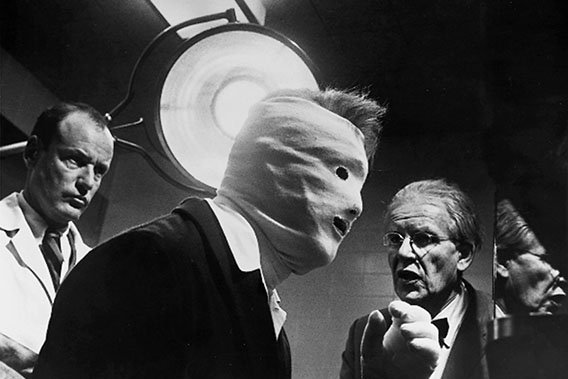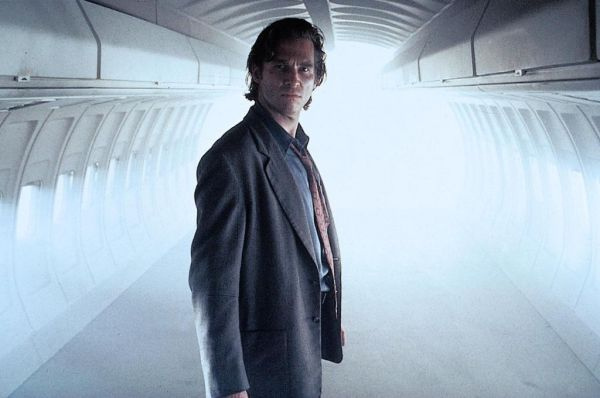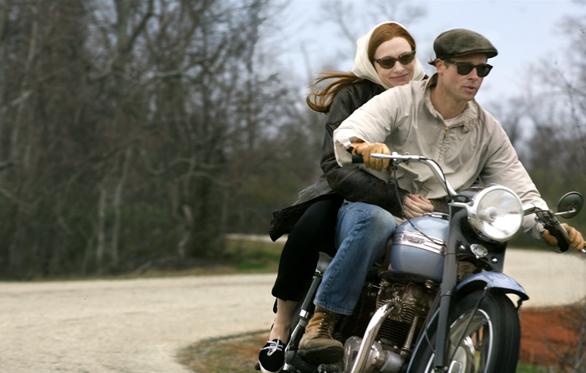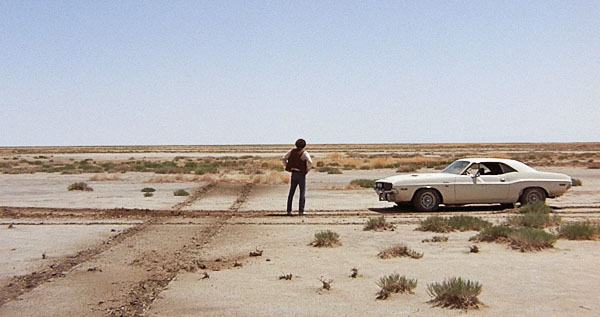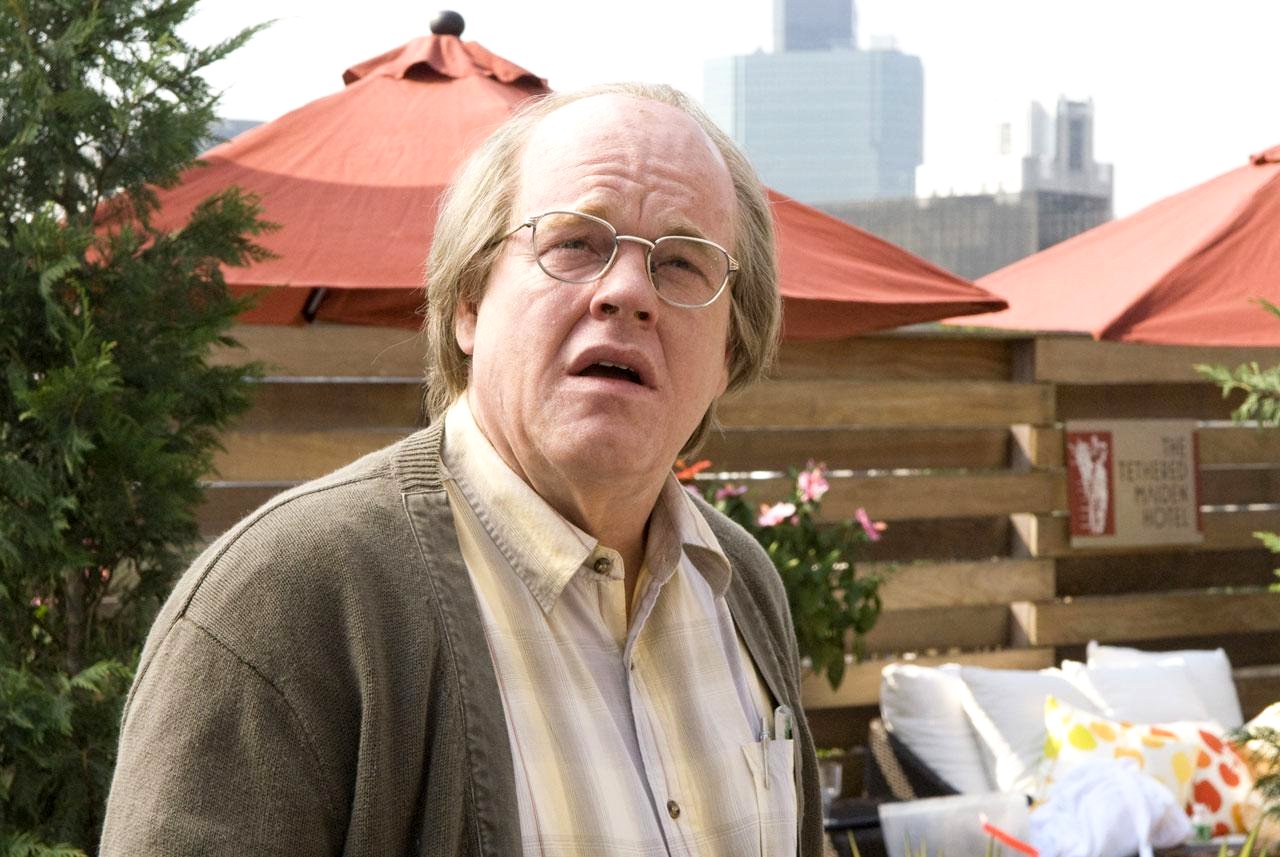8. Idiots and Angels – Bill Plympton
This animated film by Academy Award nominated artist Bill Plympton follows a loathsome, lust-filled man in his daily activities until one day he wakes up with angel wings growing out of his back. The man initially uses his newfound appendages for nefarious purposes (stealing grandma’s purse, spying on naked sunbathers etc.) but eventually the wings take on a personality of their own, forcing the once despicable man to become an unwilling participant in acts of decency.
This is a weird film by any standard. Devoid of dialog, the entire story is told through the pantomimes of its characters and environment. The highly stylized animation evokes a sort of gothic atmosphere, accompanied with the beautifully hypnotic soundtrack by Cory Jackson, Idiots and Angels is a singular experience. Throughout Plympton’s dark, surreal dreamscape of a film is the exploration of how even the most loathsome among us are capable of good. We are all at the core both idiot and angel.
9. Seconds – John Frankenheimer
Seconds is about a banker whose boring life changes when he’s offered the chance to abandon everything he knows in exchange for a new face and new life. John Randolph plays banker turned handsome painter Tony (Rock Hudson) whose initial elation about his new life is crushed when the learns the reality of his fellow “identity-changers.” When Tony decides he wants to escape his new life, it turns out to be a much more dangerous proposition than he could have imagined.
Another existential parable about a man who literally sheds his outer shell in an effort to improve his outlook on life. In the end the banker/Tony sees that changing the outside cannot transform what’s beneath the skin.
Seconds delves into questions of identity and whether even if it were possible to switch into better, more successful versions of ourselves… could we actually handle it? Seconds is reminiscent of an extended Twilight Zone episode; thought-provoking and chilling, it’s truly a hidden gem in science fiction.
10. Fearless – Peter Weir
Jeff Bridges plays Max Klein, a man who survives a plane crash unscathed and finds he is overcome with a profound fearlessness of death and steadfast dedication to being completely honest with everyone. His newfound attitude towards life not only drives a wedge between him and his family, but inspires him to attempt dangerous stunts in an effort to stoke his sensation of fear. Max eventually reaches out and falls in love with one of the other crash survivors played by Rosie Perez, whose son died in the wreck.
Fearless is about pain and fear, about how our shared experience of it can heighten the sense of being alive and also bring us together. Fearless also treads into deeper philosophical territory, exploring how one man’s brush with death forced him to see the miracle of his existence in the first place.
Note the mesmerizing scene after the plane crash as Max stops on the side of the road and spits in the dirt, mixing the saliva around with his fingers. Bridges does an excellent job conveying a personality altered in the face of extraordinary terror and grief. Fearless is one of those rare flicks you’ll find yourself thinking about long after the credits roll.
11. Spring, Summer, Fall, Winter… and Spring – Ki-duk Kim

Two monks, one old and one young live together in a secluded monastery. The film takes place over different seasons that pass throughout decades, as the young monk becomes older he makes mistakes that force him into jail. The old monk, seeing this as the end of his life decides to self immolate. The young monk eventually is released from prison and returns to the now empty monastery, taking up the reins of his master. He then gains an apprentice and the cycle starts over again.
This film might be the closest thing to a meditative experience many viewers will ever have. While slow, the movie never feels like a chore, as one could easily sit back and let the gorgeous visuals and contemplative pace wash over them. The themes are subtle and profound, demonstrating just how different the western worldview is from an eastern standpoint. If you’re in a particularly thoughtful mood Spring, Summer, Fall, Winter… and Spring will definitely give you a different perspective on life.
12. The Curious Case of Benjamin Button – David Fincher
Brad Pitt plays Benjamin Button, a baby born in the body of an old man. As he matures, Benjamin finds he is actually aging in reverse, becoming more youthful as time passes.
We follow Benjamin for his entire life, weaving in and out of different story arcs, most notably his childhood love interest Daisy played by Cate Blanchett. Though everyone in Benjamin’s life has become “older” than him physically, he’s still destined for the same march towards death that we all face. This film is based on a short story by F. Scott Fitzgerald.
This movie is filled with stunning cinematography, great performances, and truly incredible special effects. David Fincher and crew do a great job creating a melancholic atmosphere that perfectly illustrates the bittersweet nature of life. “I was thinking how nothing lasts, and what a shame that is.” says youthful Benjamin to Daisy when they finally become a couple. This statement sums up the main message of this film: appreciate our life while we can, before the onslaught of time washes everything away. Benjamin Button delivers all the goods and leaves a surprisingly haunting aftertaste.
13. Vanishing Point – Richard Sarafian
“The point at which receding parallel lines viewed in perspective appear to converge.”
Kowalski, a Vietnam veteran whose life has since unraveled is hired to drive a souped-up Dodge Challenger from Denver to San Francisco. After acquiring the car, Kowalski visits his speed dealer and makes a bet that he can complete the journey in 15 hours. Before long he is being ruthlessly pursued by the cops, and an increasingly dangerous suspect in a nationwide manhunt. All the while a blind disc jockey who has intercepted police chatter tries to aid Kowalski over his radio broadcast.
This is different than your average action-packed car chase flick. The story starts ordinarily enough, but one can soon tell that Vanishing Point has more under its hood than at first glance. As the chase continues throughout the film, Kowalski increasingly takes on an almost mythical image in the minds of the spectators to the chase. He’s a symbol for counter-culture, and the sad reality that no matter how much we want to break the cast of society the “system” or “the man” always prevails.
As the old snake wrangler says at the midpoint, “Sometimes the only way to escape is to root-in right where you are.” Nevertheless, Kowalski accepts his fate and commits suicide by driving full-speed into a police barricade. Note here that Kowalski has a strange smile while he races towards death, and also watch how the locals gather around the barricade to witness the show… then immediately begin dispersing when the car bursts into flames.
14. Synecdoche New York – Charlie Kaufman
Philip Seymour Hoffman is Caden Cotard, a theatre director whose health is ailing and family life in tatters decides to mount an ambitious production that requires a replica of New York City be built inside a Warehouse. As the project larger and more complex, the lines between fiction and reality fade.
Kaufman is the writer of such cult classics as Being John Malkovich and Adaptation. Synecdoche is Kaufman’s directorial debut, and one can see the similarities to his thought-provoking and bizarre previous works. Nevertheless, Synecdoche is arguably the most mind-bending of them all.
Hoffman’s character wants his theatre production to completely mirror real life. He wants his play to be about “everything.” This requires him to not only build a miniature city with all the inhabitants, but also a warehouse inside that city where a playwright named Cotard is building a replica of New York and so on. It’s also about relationships, illuminating the fact that the people in our lives only exist in our heads, and we’ll never be able to see people for their entirety as humans.
In short, the story stretches the imagination to the max, but in the best possible way. It’s about how we spend so much of our time toiling over insignificant problems, and ultimately it’s impossible in our feeble minds to truly see “the big picture.” Synecdoche New York is a film so loaded with symbolism and thematic elements that one can watch it repeatedly and find new things every time.
15. Magnolia – Paul Thomas Anderson
A handful of people with seemingly different trajectories in life collide with each other over a 24 hour period in San Fernando Valley. The characters range from the loathsome, to the pathetic, to the absolutely wacky, nonetheless, all are in search of the same things in life: love, forgiveness, acceptance, etc. Magnolia features an iconic third act stunt where frogs inexplicably fall from the sky like rain.
Magnolia has so many interwoven characters and story arcs that it can seem overwhelming until the pieces begin falling into place. Anderson does a masterful job in developing them over the 3 hour runtime and makes us care (more instances than not) about their respective plights.
The most memorable performance is probably Tom Cruise’s incredible portrayal of a motivational speaker/guy with daddy issues, whose guiltless womanizing turns out to be the strange result of years of neglect from his own father (played by Jason Robards). The film drives home the theme that while all of us are damaged in different ways, it’s how we treat others that illuminates our true natures.
The opus that is Magnolia is best summed up by John C. Reilly’s final monologue that ends with the question: “If you can forgive someone, well that’s the tough part… what can we forgive? It’s a hard part of the job. It’s a hard part of walking down the street.” Magnolia is one of those rare Hollywood films that will make you pause, make you think, and possibly change your perspective on life.
Author Bio: Kent Reason is a screenwriting major at Chapman University. His favorite things are coffee, camping and cats.

